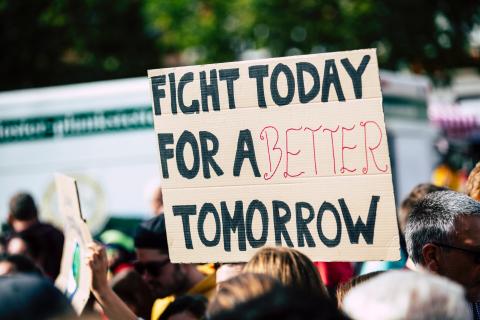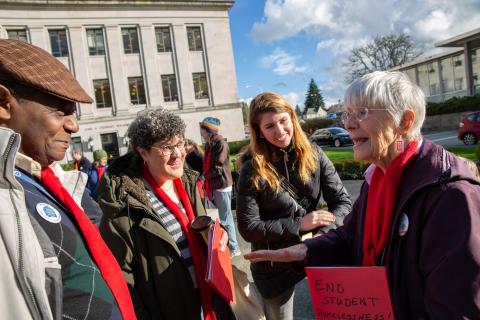We advocate for public policy that supports our vision that all Washington residents have the opportunity to live in safe, healthy, affordable homes in thriving communities.

2021 Washington State Lead Public Policy Agenda
Download our 2021 State Public Policy Priorities
BUDGET PRIORITIES
INVEST IN AFFORDABLE HOMES AND INCREASE SHELTER CAPACITY
Before the pandemic, Washington was already facing an affordable housing and homelessness crisis. To afford a two-bedroom apartment at fair market rent, a household would need to earn more than $30 per hour. There was a shortage of over 195,000 homes affordable and available to very low-income households. Almost 23,000 people were identified experiencing homelessness during the point in time count in January 2020.
The Legislature should follow the Governor’s lead and invest in $250 million to build and preserve affordable homes and $110 million to increase shelter capacity and rapidly acquire hotels and motels for shelter, transitional housing, and permanent supportive housing.
- Invest $240 million for the Housing Trust Fund to build new affordable homes.
- Invest $10 million to purchase and preserve affordable housing at risk of loss.
- Invest $70 million for rapid acquisition of property for shelter, transitional, and permanent supportive housing.
- Invest $40 million in enhanced shelter capacity grants.
ENACT GOVERNOR INSLEE’S ADDITIONAL AFFORDABLE HOUSING AND HOMELESSNESS PRIORITIES
- Maintain the Governor’s funding level for Housing and Essential Needs.
- Provide $37 million for the operations and maintenance and services in permanent supportive housing.
- Provide $35 million for local shelter capacity grants.
- Provide $14.6 million for foreclosure prevention.
- Grant expenditure authority to extend Medicaid Transformation Project and Foundational Community Supports for an additional year.
ENACT PROGRESSIVE REVENUE TO MAKE OUR TAX CODE FAIRER AND PROTECT AGAINST CUTS TO HUMAN SERVICES
In Washington, those who earn the least pay over 17% of their income in taxes, while the wealthiest pay just 3%. This makes our tax code the most regressive in the United States.
During economic downturns, human services funding is often among the first budget areas to be considered for cuts to make up for revenue losses. Cuts to human services have disproportionate impacts on Washington’s lowest income communities and on communities of color – the very communities paying the highest percentage of their income in state taxes. Lawmakers have the choice to prevent deep and harmful cuts by enacting progressive revenue and asking the wealthiest to contribute more.
PREVENT EVICTIONS AND HOMELESSNESS
CREATE A STATE RENTAL ASSISTANCE PROGRAM TO PREVENT EVICTIONS AND HOMELESSNESS (HOUSE BILL 1277/ORMSBY)
In mid-December, approximately 175,000 people lived in households who were not caught up on rent and the large majority were people of color and over half were part of households with children. Many families who were caught up reported relying on unsustainable means to meet their basic needs, including credit cards, loans from friends and family, and selling personal assets. The Department of Commerce estimates that, conservatively, $100 million per month is needed in rental assistance.
The $510 million in federal rental assistance coming to Washington will not meet the full need to get tenants caught up and make sure landlords are paid. The expected “K-shaped” recovery means that recovery will be slow for low-wage workers, many of whom will need rental assistance for an extended period of time.
The Legislature should increase the state’s document recording fee by $100 to expand rental assistance to prevent evictions and homelessness. This would bring the total fee related to housing and homelessness to $185.50. Calculated over a 30-year mortgage, that is around $6 a year or 50 cents a month for the home buyer.
IMPROVE EVICTION PROTECTIONS AND PROVIDE LEGAL REPRESENTATION (SENATE BILL 5160/KUDERER)
Even with federal relief and a new state rental assistance program, it is unlikely that Washington will have the resources to fully pay rent owed by people who have lost jobs and income starting last March. Rental assistance must be coupled with additional protections to keep tenants in their homes during and after the coronavirus pandemic.
The Legislature should ensure that tenants cannot be evicted due to rent they were unable to pay during the eviction moratorium, that they are not denied housing in the future due to inability to pay rent during the pandemic, and that they have the opportunity to enter into payment plans to catch up on rent. Currently, tenants who can’t afford an attorney are forced to argue their case against their landlord’s trained attorney. Tenants facing eviction should also be provided an attorney to argue on their behalf.
REQUIRE LANDLORDS TO HAVE A LEGITIMATE BUSINESS REASON TO EVICT (HOUSE BILL 1236/MACRI)
Outside of a handful of local jurisdictions, landlords in Washington can evict a tenant with just 20-days’ notice, even if they have never violated the terms of their lease and never paid rent late. Landlords are not required to provide any reason for these “no cause” terminations, which allows discrimination and retaliation to go unchecked and undermines Fair Housing protections.
Washington’s eviction moratorium has prevented harmful no cause terminations, but when it expires renters will once again be at risk of being forced out of their homes. Landlords can circumvent all tenant protections including eviction protections by simply giving a 20 day no cause notice. Black, Native American, Pacific Islander, and Latinx households are far more likely than white households to rent, so are at greater risk of losing their homes. Black people, particularly Black women, experience the highest eviction rates.
The Legislature should protect tenants by requiring landlords to have a legitimate business reason to terminate a tenancy. Without this policy change, rental assistance and other tenant protections will have limited effectiveness in keeping people housed, because a landlord can simply make someone move for no reason.
ADDITIONAL PRIORITY ISSUES FOR 2021
CONTINUE FOUNDATIONAL COMMUNITY SUPPORTS
Approved in 2016, the Medicaid Transformation Program is an agreement between the state and federal government to make strategic changes within Medicaid to create healthier people and communities. The agreement includes the Foundational Community Supports initiative, granting Washington the ability to use Medicaid funds to pay for services in permanent supportive housing and supported employment. Without legislative action, the waiver allowing Washington to use these funds will expire by 2022.
The Legislature should provide expenditure authority for an additional year of the Medicaid Transformation Project and Foundation Community Supports.
CLOSE THE DIGITAL DIVIDE
According to the U.S. Census Bureau, an estimated 735,000 people in Washington do not have an internet connection in their homes. An additional 500,000 households rely solely on limited cell phone data plans, while 30,000 others still use slower dial-up services.
The Digital Navigator Program will help close the digital divide for low-income communities, students, families whose dominant language is not English, elders, communities of color, and residents who need assistive technology, by providing internet access, hardware, and digital literacy support. This will help address opportunity gaps by improving access to remote educational learning, access to employment, and access to public benefits including affordable housing. The Legislature should include $6 million for in the budget for the Digital Navigators Program.
PREVENT EXPANSION OF THE MULTIFAMILY TAX EXEMPTION UNLESS IT IS IMPROVED
The multifamily tax exemption program (MFTE) provides a tax break intended to encourage the development of multifamily housing. Housing developers can access a greater tax break by including very limited affordability requirements. If the program is expanded, it must include greater rental affordability requirements, stronger tenant protections, and anti-displacement protections. Without these protections, this tax break supports gentrification and displacement of low-income people and people of color.


